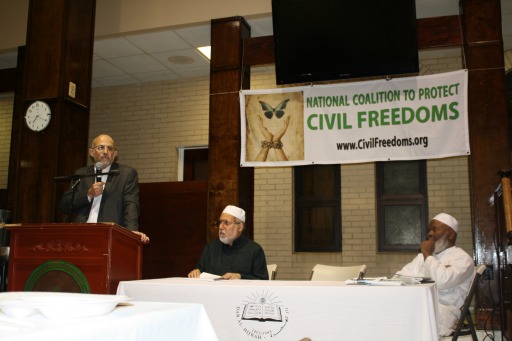
The National Coalition to Protect Civil Freedoms (NCPCF) convened for its fourth annual family retreat in Washington D.C. over the last weekend in October.
The retreat ended with a banquet and a fundraiser at Dar al Hijrah in Falls Church, Virginia near the nation’s capital on October 26, 2014. The banquet was filled to capacity with supporters from all over the DC Metro area, as well as from other states.
Sharmin Sadequee, the sister of Shifa Sadequee—a young political prisoner— opened the event with a reminder to the community that anyone could be the next target of thought crimes and pre-emptive prosecution. “Stand up for the truth,” she urged. The dinner focused on drawing attention to the current state of our civil liberties in the United States and highlighting the programs and initiatives that NCPCF conduct in regards to diminishing rights.
This year’s fundraiser was more local, more grassroots—without the big name speakers. To activists this represents the growth in the community as communities are taking ownership of their own issues and realizing the need for coalitions such as NCPCF. Dr Maha Hilal, a specialist in justice policy, helped organize the event.
Money raised is used to organize awareness events and send commissary money to prisoners. Sadequee noted that the families “organize gatherings and conferences to support each other and to build the capacity for collective social justice action by mapping the legacy of trauma on their lives as immigrants, Muslims, and people of color in the context of political repression in the United States.” They live in the crux of growing Islamophobia and limited or no support from their local communities.
This year’s family retreat’s theme was Shattering Captivity and Engendering Liberation: A Conference on Dismantling the Prison Industrial Complex. Testimony of the families shared at the conference would have broken anybody’s heart, said organizers. They wondered why the more than 8 million strong American Muslim community is not paying attention to the plight of these political prisoners and their families.
Sadequee noted that the families are learning to turn their victim-hood productively. They are organizing themselves for social justice actions, engaging with the cases of their loved ones, and leading campaigns to expose the rights violation in federal courts and prisons. “Through their brave campaigning, they call for everyone’s right to justice while simultaneously navigating the cultural shame of being targeted and the stigma of prison in their day-to-day lives under the “war on terror.”
Veteran civil right advocate Agha Saeed came from California despite his weakened condition to attend the fundraiser. Muhammad Malik of Amnesty International attended the event along with Darakshan Raja, a victim’s advocate and a justice policy researcher at the Urban Institute. Also in attendance was Imam Magid of ISNA and ADAMS Center. Imam Shaker El-Sayed was delighted with his presence and asked him to lead the Isha Salah.
Imam Siraj presented a dynamic way of looking at the purpose of the gathering.
“How many more cases of innocent people do we need to see?” asked Imam Siraj Wahhaj, who led the fundraising. “You need to take this cause that personally, like that is your brother in prison.” Aafia Siddiqui’s case was also discussed by the organizers as they acknowledged the work of Mauri Saalakhan.
Yasmin attending the event from Virginia said that one of the things she thinks about is that most people think that this will not happen to me but no one is safe from it.
Many families felt abandoned by their communities. The thought that if this was happening to any other group of people, there would be an outrage was ever present. “I was this lost girl who lost all hope, faith in myself, the situation, and those around me…From the moment when I walked off the plane I felt like the weekend was going to change me and it was going to be a positive one, and I haven’t had a reason to smile for a while but that weekend I did. When I started getting to know other people and I saw that I was not alone and I was no longer forgotten. I felt that others were in the same position as I was in, in a way we all saved one another when we showed up. We all impacted each other in multiple ways. I felt like the broken family I had at home found its missing link,” Reem Jayyousi wrote in a photo essay on medium.com regarding the conference organized by NCPCF for the families of Muslim prisoners.
Maryam Abu Ali, the sister of Ahmed Abu Ali who was detained 11 years ago and sentenced for life based on a testimony derived through torture that he suffered in Saudi jails, also attended in solidarity with other families. Ahmed Abu Ali, from the Northern Virginia Muslim community, was brought back to the United States but evidence of his being tortured was not allowed in court. He was found guilty of conspiring to assassinate then President George W. Bush Ali and sentenced to life; Abu Ali has been in solitary confinement for the past 10 years. Several women from the Dar Al-Hijrah community remembered the family’s ordeal and chatted about that dark period in the community’s history over warm food cooked in the masjid’s cafeteria.
As pledges were made, masajid and organizations were urged to hold fundraisers for the coalition in their own spaces.